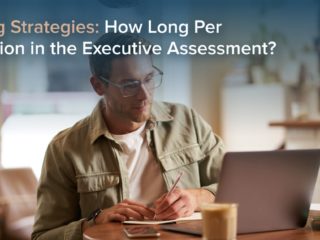|
Getting your Trinity Audio player ready...
|
Regardless of how well you may have prepared for the Executive Assessment, knowing how to guess is vital to your success. I understand that, in a perfect world, you would correctly answer all questions confidently and easily. However, in the real world, some amount of guessing may be necessary on the EA. In fact, knowing when and how to guess could make the difference between hitting and not hitting your target score. Thus, you need to have a guessing strategy in place. So, in this article, we’ll discuss Executive Assessment guessing strategies.
Here are the topics we’ll cover:
- On the EA, You Can Go Back and Change Answers
- Educated vs. Random Guessing
- Educated Guessing
- Random Guessing
- Guessing to Catch Up on Time Is Not a Wise Strategy
- It May Sound Obvious, But Answering Questions Quickly Is How You Catch Up on Time
- If It’s Clear You Have No Shot at Correctly Answering a Question, Take a Random Guess
- If You Must Guess, Do So, and Mark the Question for Review
- When You’re Running Out of Time, It’s Acceptable to Take a Random Guess
- Key Takeaways
- What’s Next?
Let’s begin by examining some key EA test mechanics to clarify what it means to “guess” on the EA.
On the EA, You Can Go Back and Change Answers
Each section of the EA (IR, Verbal, and Quant) is split into two modules. For example, there are two modules of seven questions each for quant. At the end of each module, there is a review screen from which you can go back and revisit any questions in the module. This feature is important because, even though you may have already answered a question in a module, you can adjust the answer before moving to the next module.
So, because of this feature of the EA, you can make guesses knowing that you will have an opportunity to adjust those guesses before moving to the next module or section.
TTP PRO TIP:
Your EA guessing strategy should involve the idea that you can review questions from a module before moving to the next.
Now, let’s discuss two main types of guessing we will use on the EA.
Educated vs. Random Guessing
There are two kinds of guessing that can be used on the EA: educated guessing and random guessing. Let’s first talk about educated guessing and when and why we would make an educated guess.
Educated Guessing
An educated guess on the EA is a guess made after we’ve eliminated some answer choices or determined that some choices are more likely to be correct than others. Eliminating a few answer choices before making a guess greatly increases our odds of landing on the correct answer.
When to Make Educated Guesses
First things first. An educated guess is always preferred over a random guess. After all, when making an educated guess, we’ve already done some legwork, which has allowed us to reduce the pool of potential answers. On the other hand, when guessing randomly, we guess among all the possible answers.
So, when should we make an educated guess? When we “hit a brick wall” on a question but, at the very least, can still remove one or more answer choices, it can make sense to make an educated guess. That said, remember that the fact that we have guessed within a module doesn’t mean the answer is final.
TTP PRO TIP:
Eliminating a few answer choices before making a guess helps our odds of landing on the correct answer.
Let’s now review an example of when I’d recommend taking an educated guess.
Example of Taking an Educated Guess
Consider the following example question:
At a game arcade, there were 7 children who had 9 tickets each and 21 children who had 25 tickets each. What is the approximate average number of tickets held by the 28 children?
- 15
- 17
- 19
- 21
- 23
Scenario:
While this is not a difficult problem, it could take some thinking and/or some time to calculate the correct answer. You might have trouble remembering the formula for the weighted average. Or you might be running low on time in the section. This is where educated guessing is your best friend!
In either case, you can use basic knowledge of weighted averages to deduce that the correct answer must be between 9 and 25 tickets.
Additionally, if the number of children holding 9 tickets were equal to the number of children holding 25 tickets, then the average number of tickets of all 28 children would be the arithmetic average of 9 and 25, which is 17. But because there are quite a few more children with 25 tickets than 9, the average must be greater than 17, and it is highly likely that the average is even greater than 19.
Thus, you can determine relatively quickly that there are two viable options: 21 and 23. Having narrowed the choices down to those two, you now have a 50% chance of guessing the correct answer instead of a shot-in-the-dark 20%. This is an example of using your knowledge about a topic to make an educated guess.
Here’s the correct answer, obtained by using the weighted average formula:
[(7×9) + (21×28)} / 28 = 588 / 28 = 21Answer: D
Let’s now discuss educated guesses in more detail by looking at some scenarios in which making educated guesses is the right move.
Knowing Your Strengths and Weaknesses Will Enhance Your Guessing Strategy
Knowing your strong and weak areas will help you make informed guesses on the EA. For example, let’s say that you know that probability is a weak topic of yours. If you see a probability question, you can spend 30 to 45 seconds trying to eliminate a few answer choices and then take an educated guess.
If you were not aware that probability is a weak area for you, you might overspend on the probability question because you might be hell-bent on correctly answering before moving on. However, because you know your weakness and strategically guess, you now have more time to answer questions that fall within your areas of expertise.
TTP PRO TIP:
By knowing your weak areas, you’ll know the questions on which you should be taking educated guesses.
Next, let’s discuss the scenario of guessing and moving on from questions you know you should correctly answer.
It’s OK to Guess and Move on From a Question That You Would Have Gotten Right on Another Day
If you’ve had much experience with the EA, you know you may see a question that normally you could answer correctly but, for some reason, is just not going your way. If you find yourself in that scenario when taking the EA, you must force yourself to guess and move on. Spending 5 minutes in a losing battle is not an option!
Even if you spend 5 minutes on the question and finally figure out the correct answer, you’ll undoubtedly pay a time price later. Thus, you must focus on the bigger picture. Strategically guessing when you are spinning your wheels is always the right move.
TTP PRO TIP:
Occasionally, you have to guess on questions you know you should correctly answer.
Now let’s discuss that other type of guessing: random guessing.
Random Guessing
Random guessing is common when we have no idea how to answer a question or are running out of time on a particular section or module. Let’s discuss some of those scenarios now.
Guessing to Catch Up on Time is Not a Wise Strategy
Timing is a struggle for almost all EA test-takers. To help with their timing woes, some EA students blindly guess to catch up on time. If you consider doing this, I will say it’s not a good strategy! When taking blind guesses, the issue you face is that you may be guessing on easy questions. And, of course, getting easy questions wrong won’t improve your score.
TTP PRO TIP:
If you blindly guess on questions, you may guess on easy questions and thus negatively impact your score.
It May Sound Obvious, But Answering Questions Quickly Is How You Catch Up on Time
One thing that students forget is that not all questions have to be answered in the same amount of time. For example, some questions “should” take 30 seconds while others should take three minutes. So, if you ever fall behind on time, do your best to catch up organically. Let’s look at the following example to get an idea of what I mean.
9! + 6! is equal to which of the following?
- 362,886
- 362,999
- 363,600
- 363,722
- 363,815
Let’s consider a scenario in which you know you’re behind on time, and the above question appears on your screen. If you are a seasoned EA test-taker, you likely can answer the question in about 15 seconds!
In case you’re wondering, we can answer the question quickly because any factorial greater than 4! will always end in zero. Thus, 9! + 6! must end in zero, so C is the only possible correct answer.
Next, let’s discuss a scenario in which taking a random guess is OK.
If It’s Clear You Have No Shot at Correctly Answering a Question, Take a Random Guess
Even if you prepare thoroughly for the Executive Assessment, there may be questions on specific topics you know you’ll struggle with. So, if you see one of these questions and know it’s not solvable for you, then take a random guess! For example, let’s say you did not have time to study combinations and you see the following problem.
From a group of 8 magicians, in how many ways can 3 magicians be selected to join a traveling carnival?
- 56
- 96
- 102
- 120
- 144
If you have not studied this topic, then there’s a slim chance of your being able to answer the question correctly. Thus, it’s a good time to take a guess! If you are wondering, here’s the solution:
We select 3 magicians from 8. This is a combination problem because the order of selection does not matter. This can be done in 8C3 ways, which is:
8C3 = 8! / (3! X 5!) = (8 x 7 x 6) / (3 x 2 x 1) = 56
Answer: A
TTP PRO TIP:
If you encounter a question on a topic that you are unfamiliar with, take a random guess.
If You Must Guess, Do So, and Mark the Question for Review
Although you can skip questions within a module on the EA, answering each question as you encounter it is still a good practice. Then, if you have time before moving to the next set of questions in a module, reattempt the question. However, if you don’t have time, at least you have answered each question, and heck, maybe you’ll get lucky with your guess. On the other hand, if you leave a question unanswered, then you have no shot at getting it correct.
TTP PRO TIP:
Answer all questions you encounter on the EA, even if you have to take a guess.
When You’re Running Out of Time, It’s Acceptable to Take a Random Guess
You can relate to the following scenario if you’ve taken the EA or even a practice EA. You look up at the clock and see that you have just 30 seconds left, but you have two questions to answer. If you find yourself in that situation, you don’t need me to tell you to guess! Remember, the probability of correctly answering a question on a random guess is 20%, whereas the probability of getting a question correct with no answer is 0%.
TTP PRO TIP:
Skipping questions ensures you have a 0% chance of correctly answering those questions.
Key Takeaways
- On the EA, you may skip questions in a given section and return to answer them later, or you may answer a question and later return to the question and change your answer.
- Guessing is a viable strategy to use when taking the EA.
- There are two types of guessing: educated and random.
- Educated Guessing: If you can eliminate one or more choices before answering a question, you will increase your odds of getting the question correct.
- Knowing your strengths and weaknesses will help you to decide if you should invest time to work through a question or should take a guess and move on.
- Don’t blindly guess on a question. Read the question first to ascertain whether you can solve it, then solve it, make an educated guess, or take a random guess.
- Do not leave any questions unanswered. If you are running out of time, make sure you mark an answer, even if you have to make a blind guess.
What’s Next?
Smart test-takers have many tools in their arsenal, including the knowledge of when and how to use guessing to their advantage. However, nothing beats having a strong foundation in all quant and verbal topics, so guessing is a minimal part of test day.
To get that strong foundation, you may want to read this article about effective study strategies for the EA or sign up for a trial to the TTP EA Online Course.



